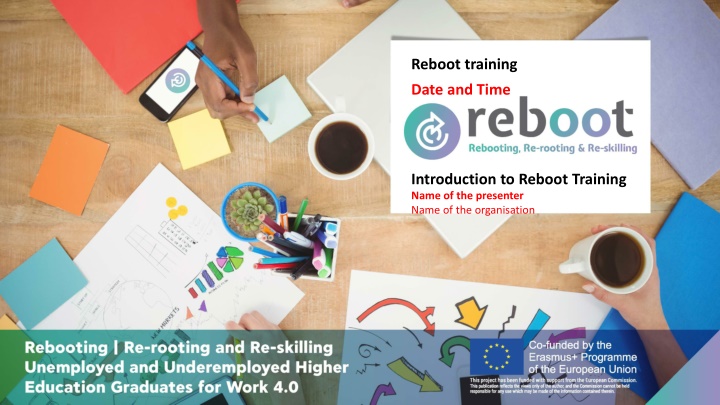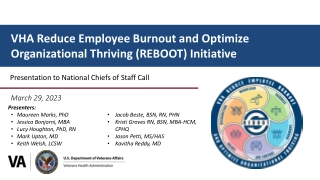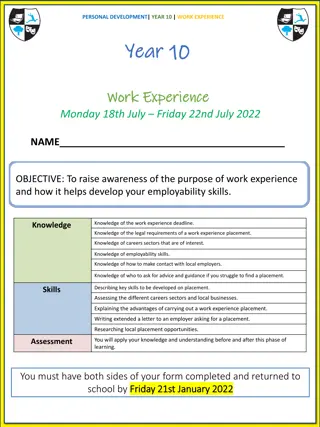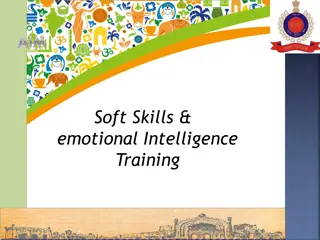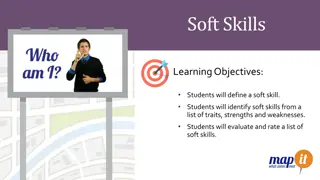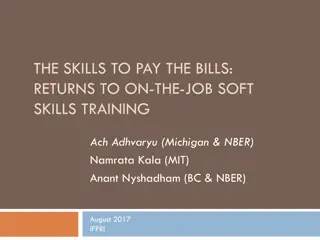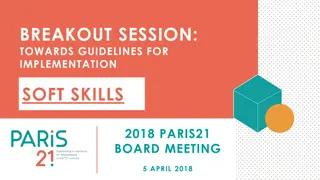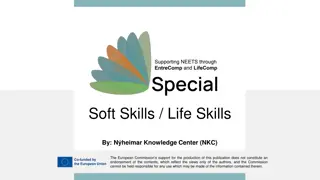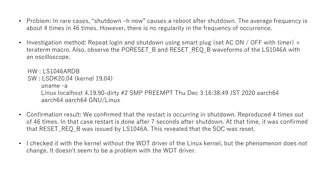Reboot Training - Developing Soft Skills for Employability
Reboot Training helps unemployed and underemployed higher education graduates recognize, develop, and showcase their soft skills to increase employability in today's changing work environment. Participants learn the importance of soft skills, how to acquire and demonstrate them effectively, and how to adapt to diverse professional settings. Through a structured program, they enhance self-awareness, resilience, teamwork, time management, leadership, and more, preparing them for successful careers. The training also emphasizes productizing and marketing one's skills to potential employers. Developed under the EU Erasmus+ project, Reboot addresses the challenges of evolving work landscapes and empowers individuals to navigate the job market with confidence.
Download Presentation

Please find below an Image/Link to download the presentation.
The content on the website is provided AS IS for your information and personal use only. It may not be sold, licensed, or shared on other websites without obtaining consent from the author.If you encounter any issues during the download, it is possible that the publisher has removed the file from their server.
You are allowed to download the files provided on this website for personal or commercial use, subject to the condition that they are used lawfully. All files are the property of their respective owners.
The content on the website is provided AS IS for your information and personal use only. It may not be sold, licensed, or shared on other websites without obtaining consent from the author.
E N D
Presentation Transcript
Reboot training Date and Time Introduction to Reboot Training Name of the presenter Name of the organisation
Agenda of the Session Agenda of the Session Introduction to Reboot training Getting to know each other Common practices and rules Reboot training platform Break The initial Self-Test Presenting Module 0 - Introduction to Soft Skills Conclusions and end of the session 2h
Reboot Training Reboot Training Reboot Training helps unemployed and underemployed higher education graduates to recognise, develop and showcase their soft skills to adapt to the changing work life and its requirements, and hence to increase their employability potential. Reboot training tackles the challenges of changing work life, changing and disappearing professions and automatisation. What will you learn: What soft skills are Why are soft skills required in work life How to recognise, upskill and develop soft skills How to adapt skill in different professional realities, opportunities and careers How to productise and showcase soft skills and competences to a potential employer with portfolios. Reboot training has been developed during an EU Erasmus+ programme co-funded project called Reboot - Rebooting, Re-rooting and Re-skilling Unemployed and Underemployed Higher Education Graduates for Work 4.0 . Read more about the project at http://reboot-project.eu/
REBOOT TRAINING SKILLS ASSESSMENT AND RECOGNITION Self-test part 1 and part 2 Module 0: Introduction to Soft Skills REBOOT TRAINING PROGRAMME Module 1 About me: How I Work Module 3 Into Action: Get to Work! Module 2 Context: How We Work Self-awareness Resilience Teamwork Taking initiative Time management Networking Understanding Change Change management Adaptability Interpersonal skills Leadership Creativity Interdisciplinary skills Tolerance and Culture Learning from experience Problem solving Curiosity Self-efficacy Openness Motivation Negotiation skills Planning PRODUCTISATION AND MARKETING OF OWN SKILLS Module 4: Career and skills flexibility Self-test part 1 and part 2 Module 5: Portfolio creation
Reboot Soft Skills Reboot Soft Skills Module 1 Module 2 Module 3 Self-awareness Resilience Understanding change Adaptability Curiosity Openness Resilience Self-efficacy Motivation Teamwork Interpersonal skills Tolerance and culture Negotiating skills Networking Mobilising others Interdisciplinary skills Taking initiative Creativity (spotting opportunities) Learning from experience Planning Time management Change management Problem solving
Reboot Training Method Reboot Training Method Real life and work life scenarios to understand how soft skills manifest. Reflection on soft skills and how to use them in a working context and challenging situations. Scalability from personal reflection - to context to reality. Productising recognised soft skills. Visualisation in portfolios. Self-test helps to understand which soft skills require more training. A progressive structure: What soft skills are training their application into a career context showcasing with portfolios Modules: Me and soft skills Interpersonal soft skills action soft skills Scalability in exercises: from self to work, from simpler to more complex exercises, and finally examples.
Reboot Training Evaluation Reboot Training Evaluation Assessment is Reboot training is personal and self-reflective supported by the trainer focusing on soft skills, their development and application. 1. The self-test provides information to learners about their level of mastering and developing soft skills, of stronger and weaker soft skills. 2. Exercises: how is soft skills application, comprehension and development manifesting. 3. Learning diary: Learners are encouraged to keep a learning diary of their development, ideas, insights, understanding, and attitudes towards soft skills and their application to work life. Learning diary should be updated regularly, for example daily or when studying and getting an idea or insight, and write: To be written regularly. Any findings related to soft skills and what you think of them. What was easy, what was difficult? Observations of others and soft skills, and any other findings.
Training Materials and Delivery Training Materials and Delivery Training materials Reboot training platform: www.reboot-project.eu. Handbook for learners ADD ADDRESS Content: knowledge about soft skills and skills productisation, reflection, exercises, examples and open educational resources. Pinterest for portfolio examples: https://gr.pinterest.com/rebootproject2020/ Training delivery Online/ blended learning [Choose one and add how it is delivered at your session]
Reboot Training Sessions Reboot Training Sessions Session Delivery method and where When Duration of the session Introduction to Reboot training [Add your option] [Add your option] [Add your option] Introduction to soft skills [Add your option] [Add your option] [Add your option] Module 1 About Me: How I Work [Add your option] [Add your option] [Add your option] Module 2 Context: How We Work [Add your option] [Add your option] [Add your option] Module 3 Action: Get to Work! [Add your option] [Add your option] [Add your option] Module 4 Career and Skills Flexibility [Add your option] [Add your option] [Add your option] Module 5 Portfolio Creation - Potential individual portfolio mentoring sessions [Add your option] [Add your option] [Add your option]
Getting to Know Each Other Getting to Know Each Other Introduction of the participants Motivation to take part in Trianing An ice-breaking activities [Select from the options below. You can leave the explanation or just have the names of the exercises] Two truths and 1 lie: Each participant at their turn tell three statements about themselves, for example, I used to play ice-hockey . Two of these are true and one is a lie. The others need to spot which one is a lie. A song from a word: Give each participant a word. They need to find a song using that word. For example, Mamma , the associated song can be Mamma Mia by ABBA. Word associations: Go around the participants with word associations. Give the first one (e.g. hammock) to the first participants who must say an associated word for your word within a few seconds. Then the next one will say one for her/his word, etc. Go through all participants. Favourite things: Show (picture) or tell them about your favourite thing. It can be a landscape, a moment, cat s purr, etc. As each participant to do the same at their turn. Name adjectives: Ask each participant to tell their (first) name with an adjective for each letter of their name. Willingly, the last word can be a subjective. For example, Anna adorable, natural, nasty, amiral.
Our Golden Rules for Training Our Golden Rules for Training No judgement Use empathy Confidentiality What else? Let s define our own rules!
Practicalities to Agree On Practicalities to Agree On Communication channels Channel Style and time Topic heading Social media Other platforms and channels Materials will eb available at: Presence at sessions Compensation Certification Contact information of the trainer [Add yours here]
Reboot Platform Reboot Platform http://reboot http://reboot- -project.eu/ project.eu/
Break Break
Entry Level Self Entry Level Self- -test on Soft Skills test on Soft Skills Self-test on soft skills helps you to test your level of awareness and mastering of soft skills. This helps in defining which skills require most training. training pathways The entry level of soft skills. To get an insight of how soft skills manifest in different work, and other, situations. Understanding and mastering of soft skills will be tested again t the end of training to see the development. Self-development.
Entry Level Self Entry Level Self- -test on Soft Skills test on Soft Skills Self Self- -test in Practise test in Practise The self-test is in two parts: A multiple-choice test to measure how you understand the soft skills and its benefit at work Narrative questions of work life scenarios which tests the application of soft skills in work life (also other) situations. Results: Part 1: no right answers, spider diagram Part 2: right answers, score x/22 and the right answer indicated Access: ADD LINK + PICTURE Time: 50 minutes Discussion
Module 0 Module 0 Introduction to Soft Skills Introduction to Soft Skills The module presents what soft skills are, why are they important, and how to recognise and develop them, The module creates a base understanding for the rest of the Reboot Training modules. What is your idea of soft skills? How they manifest? Why are they important?
Module 0 Module 0 Introduction to Soft Skills Introduction to Soft Skills What soft skills are: Soft skills are innate and non-cognitive traits which also manifest as skills and can be further developed to serve for different purposes from personal life to work life. Soft skills are sector-agnostic. They manifest in everyday challenges and daily behaviour, and as they are very related to the emotional side of human nature, therefore the way soft skills are shown may be influenced by the situation and the different external stimuli, hindering even more their quantification. Soft skills are for instance, problem solving, creativity, readiness for change, internationality, people skills and communication. While hard skills are relatively easy to measure through qualifications and certificates, soft skills are widely difficult to quantify. Soft skills can be learnt through study, practice and application.
Module 0 Module 0 Introduction to Soft Skills Introduction to Soft Skills Why are soft skills important: Soft skills help to deliver the work. Soft skills are required to deliver the work and its content. For instance, learning theory and technical elements are not enough for an engineer, but soft skills, such as for instance problem solving and people skills are needed to deliver the work. Soft skills are sector agnostic and they are needed in every sector. They help to transfer between jobs and positions as one brings them to the new occupation or position. Soft skills make an employee more adaptable and flexible for an employer and hence more valuable, but they also protect an employee in a constantly changing work life.
Module 0 Module 0 Introduction to Soft Skills Introduction to Soft Skills Let s have a deeper look at them [Select from the options below and give others as homework] Saving Soft Skills From Extinction | Scott Asai | TEDxLaie https://www.youtube.com/watch?v=74S8h3BpBPs 135 Soft Skills List to Stand Out on a Resume or Job Application https://www.developgoodhabits.com/soft-skills-list/ The Growing Importance of Soft Skills in the Workplace https://medium.com/@raybwilliams/the-growing-importance-of-soft-skills-in-the- workplace-8c452c7c8647 These 4 Trends are Shaping the Future of Your Job http://www.thoughtleaders.nz/post/future_of_work/these_4_trends_are_shaping_t he_future_of_your_job/283 Skills and the Future of Work https://iloblog.org/2018/02/26/skills-and-the-future-of- work/
Conclusions and Homework Conclusions and Homework Reflections about today s session? Did you gain new insights and ideas? What did you learn? What did you understand of your soft skills? Have your expectations for training changed? Any other thoughts? Homework Theory and OER of the Module 0 Introduction to Soft Skills Starting to write a learning journal: To be written regularly. Any findings related to soft skills and what you think of them. What was easy, what was difficult? Observations of others and soft skills, and any other findings.
http://reboot-project.eu/ #RebootProjectEU Facebook: Reboot Project Pinterest: tps://gr.pinterest.com/rebootproject2020/ The European Commission support for the production of this publication does not constitute an endorsement of the contents which reflects the views only of the authors and the Commission cannot be held responsible for any use which may be made of the information contained therein. Suomessa Erasmus+ -ohjelman hallinnoinnista ja toimeenpanosta vastaa Erasmus+ -ohjelman kansallinen toimisto Opetushallituksessa
